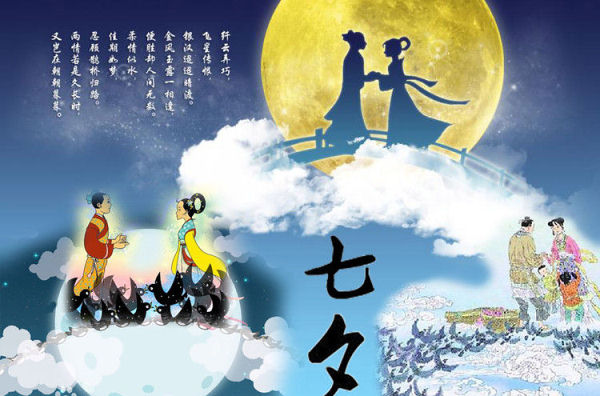The most expecting day for lovers in China in 2014, QiXi Festival, will fall on August 2, 2014. QiXi Festival, falling on the seventh day of seventh lunar month, is what Valentine’s Day to the western countries.
The origin of QiXi Festival
QiXi Festival comes from the Legend of Niu Lang and Zhi Nü, one of the Chinese four folk legends concerning love.

Niu Lang, a cowboy, was kind-hearted and hard-working. With no living parents, he lived with his brother and brother-in-law, and was maltreated. One day, after having been driven out of his home, an old man (in fact a supernatural being), guided him to the sick cattle from heaven. With great care from Niu Lang, the cattle recovered. In order to show gratitude to Niu Lang, the cow helped him get acquainted with Zhi Nü – a fairy from the heaven. They fell in love with each other and married to live a happy life with Niu Lang planting in the field while Zhi Nü did weaving at home. They were also magically given a boy and a girl.〈/p〉
However, good times didn’t last long because Zhi Nü’s deeds were known by the king of the heaven who took her back to heaven. With the cow’s help, Niu Lang flew to heaven along with his two children as they chased their wife and mother. It was just at that moment before he could reach Zhi Nu that the queen of the heaven created a huge river between them. Tears from the two flowed continuously so that even the queen was moved. As a result, she allowed them to meet only on the seventh day of the seventh lunar month every year. Therefore, the day that Niu Lang and Zhi Nü meet is the present QiXi Festival.
The customs – How to Celebrate QiXi Festival
Praying for skillful hands
The most prevalent custom is that of girls praying to Zhi Nu for skillful hands for sewing. Because Zhi Nü is regarded as a beautiful woman deft at weaving, in the evening of the festival, girls sew some articles to compete with each other and prepare some delicious fruits to worship Zhi Nü in order to be endowed with the masterly sewing skill. Not only hoping for this skill, they also pray to have a sweet love.
Praying for a good spouse
Girls may also recite traditional prayers for dexterity in needlework, which symbolize the traditional talents of a good spouse. Divination could take place to determine possible dexterity in needlework. They make wishes for marrying someone who would be a good and loving husband. During the festival, girls make a display of their domestic skills. Traditionally, there would be contests amongst young girls who attempted to be the best in threading needles under low-light conditions like the glow of ember or a half moon. Today, girls sometimes gather toiletries in honor of the seven maidens.
Gazing star Vega and star Altair
In the rural regions, a festoon is placed in the yard. Single and newly-wed women make offerings to Niulang and Zhinü, which may include fruit, flowers, tea, and face powder. After finishing the offerings, half of the face powder is thrown on the roof and the other half divided among the young women. It is believed that by doing this, the women are bound in beauty with Zhinü.
In the rural regions, people will gaze to the sky to look for Vega (Weaving Maid, representing Zhi Nü) and Altair (Cowherd, representing Niu Lang) shining in the Milky Way, while a third star forms a symbolic bridge between the two stars. It was said that if it rains on this day that it was caused by a river sweeping away the magpie bridge, or that the rain is the tears of the separated couple. It is said that you can hear the lovers talking if you stand under grapevines on this night.
The festival also held an importance for newly-wed couples.[2] Traditionally, they would worship the celestial couple for the last time and bid farewell to them. The celebration stood symbol for a happy marriage and showed that the married woman was treasured by her new family.
Today’s QiXi Festival
QiXi Festival is as important as the Western Valentine’s Day in Today’s China. Like the presents of Valentine’s Day, flowers and chocolates are also the popular ones on QiXi Festival.
Whatever way the festival is spent, great love is expressed between the lovers.